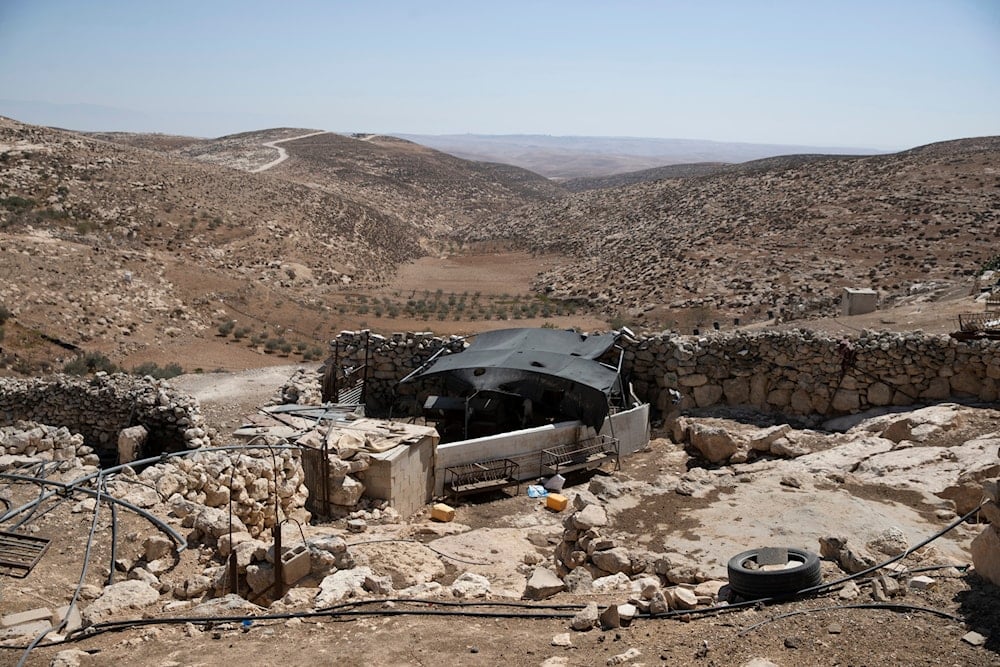Ecocide in al-Khalil razes seed bank, erasing generations of heritage
"Israel’s" destruction of Palestine’s seed bank is an act of ecocide, severing agricultural heritage and threatening Palestinian food sovereignty and survival.
-

A stockyard that suffered damage following a settlers' attack from nearby settlement outposts on the Bedouin community, in the West Bank village of al-Mufagara, near al-Khalil, Thursday, Sept. 30, 2021 (AP)
On July 31, 2025, in the city of al-Khalil, Israeli bulldozers demolished the Union of Agricultural Work Committees’ seed multiplication facility, the last surviving national seed bank in Palestine. This act of destruction did not target militants or weapon depots but the living memory of Palestinian agriculture.
In just hours, over 70 heirloom seed varieties, known as baladi, were buried under rubble. These seeds, many of which no longer exist elsewhere, represent generations of knowledge and co-evolution between Palestinian farmers and their land. Their destruction marks an irreparable blow not only to Palestine's food sovereignty but also to global biodiversity.
In an op-ed for Truthout, Ila Ravichandran exposes the deliberate destruction of West Bank al-Khalil's national seed bank by Israeli forces, framing it as ecocide that erases generations of Palestinian agricultural heritage. She highlights how this attack severs cultural and food sovereignty, threatening the very survival of future Palestinian communities.
Ecocide as temporal warfare
The Union of Agricultural Work Committees denounced the attack as “an act of erasure intended to sever the generational ties between farmers and their land.” What occurred in al-Khalil constitutes ecocide, the deliberate and systematic destruction of ecosystems with knowledge of the long-term consequences for human survival.
But in Palestine, ecocide does not stand alone. It operates within the framework of a broader genocidal project. When destruction targets a population’s future ability to survive, through famine, dispossession, and cultural erasure, it aligns with Article II(c) of the Genocide Convention: “Deliberately inflicting on the group conditions of life calculated to bring about its physical destruction in whole or in part.”
Why seeds matter: Memory and resistance
These heirloom seeds are not commodities; they are living libraries of genetic resilience. Cultivated for generations in the West Bank and Gaza, they carry vital traits such as drought resistance, soil adaptability, and nutritional value, characteristics increasingly lost in commercial seed varieties. Their destruction is not just environmental; it is civilizational.
Palestinian farming traditions go far beyond subsistence. Agriculture has long been a cultural and political act, one that connects the people to the land, sustains resistance, and affirms identity. Uprooting this connection is part of a systematic strategy to erase Palestinian presence and future.
Pattern of erasure
In August 2025 alone, "Israeli" forces uprooted 3,000 olive trees in al-Mughayyir, near Ramallah. Since October 2023, more than 52,300 olive trees have been destroyed across the West Bank. Over the last six decades, that number has climbed to more than 3 million.
Each tree uprooted is an assault on ancestral knowledge, livelihood, and ecological sustainability. The goal is clear: eliminate the material and cultural conditions for Palestinian self-determination.
Even if land were to be restored tomorrow, the essential knowledge and the seed varieties themselves may be lost forever. The extinction of traditional seed varieties is a global emergency. Industrial agriculture has already eliminated 75% of agricultural biodiversity in the last century. As climate change accelerates, the genetic traits held by traditional seeds become essential tools for human adaptation and resilience.
The destruction of Palestine’s seed bank is a loss for the global gene pool. Traits for drought tolerance, pest resistance, and soil compatibility, all of which are essential to surviving an unpredictable climate future, are being systematically eradicated.
Ecocide as a strategy of control
Seed banks and agricultural infrastructures are increasingly targeted during conflict, making this a strategic tool of domination, forcing populations into dependency on external food systems controlled by occupying or imperial powers.
This is slow violence, as environmental scholar Rob Nixon has called it: a form of harm that unfolds over generations, undermining the capacity of entire populations to sustain themselves.
The future, severed
Seeds destroyed today cannot be replaced tomorrow. Their genetic codes are the product of thousands of years of adaptation, care, and cultural memory. Palestinian children born today will inherit a biologically impoverished landscape; if current trends continue, their descendants may inherit even less.
This is the logic of ecocide: to weaponize the future by ensuring it cannot take root. It is a genocidal tool, as much as any bomb or bullet.
Efforts are growing to recognize ecocide as a crime against humanity. Several nations have criminalized it in domestic law, and campaigns are underway to include it within the jurisdiction of the International Criminal Court.
But legal recognition is not enough. Justice must be intergenerational, capable of responding to harms that transcend the present and impact generations not yet born. Accountability must address not just damage, but biological and cultural impoverishment.
Seeds of refusal
Despite the attacks, Palestinian seed savers persist. Every act of preservation is an act of resistance, a refusal to let "Israel's" occupation erase the future. Vivien Sansour, founder of the Palestine Heirloom Seed Library in Battir, continues to search for and propagate endangered varieties.
Sansour sees seeds not just as biology, but as stories, saying, “I have seen seeds make their way out of concrete. I have saved my own seeds in ashes. Life insists on itself — not because of us, but despite us.”

 5 Min Read
5 Min Read










